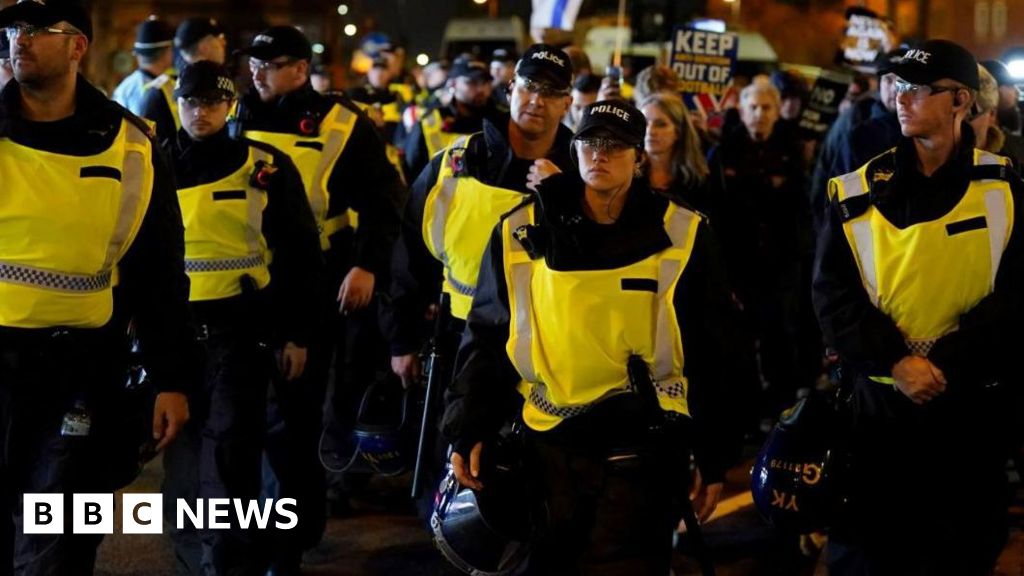Hundreds of protesters at Villa-Maccabi game

```html Heightened Security and Protests Surround Aston Villa-Maccabi Tel Aviv Europa League Match
A significant police presence and multiple protests marked Aston Villa's Europa League match against Maccabi Tel Aviv in Birmingham, England. The match, which Aston Villa won 3-0, was played under tight security after a controversial decision to ban away fans following intelligence reports of potential violence. Over 700 police officers were deployed to manage the situation as pro-Palestinian and pro-Israeli groups gathered outside Villa Park.
Away Fan Ban Sparks Controversy
The decision to bar Maccabi Tel Aviv supporters was made by Birmingham's Safety Advisory Group based on intelligence from West Midlands Police. Reports suggested a high risk of violence stemming from extremist elements within the Israeli club's fanbase, with concerns over a history of racist chanting. This ban ignited considerable debate, with some MPs questioning the police's assessment. Maccabi Tel Aviv ultimately stated their supporters would not travel due to safety concerns.
Chief Superintendent Tom Joyce, Birmingham's police commander, acknowledged the unprecedented level of concern surrounding the match. "We police football matches a lot. We police protests a lot. We deal with all sorts of public order scenarios, but certainly the level of interest, the level of concern around this match is pretty unprecedented," he stated.
Arrests Made Amid Protests
Prior to kick-off, police arrested six individuals. Three were arrested on suspicion of racially-aggravated public order offences. Other arrests included a man for failing to comply with an order to remove a face mask and a teenager for breaching a dispersal order. A further arrest was made for breach of the peace.
Pro-Palestinian protesters waved flags and banners calling for an end to violence in Gaza. Pro-Israeli campaigners staged a counter-protest. Flatbed vehicles carrying electronic billboards with messages opposing antisemitism circulated near the stadium. Messages included "Ban hatred not fans" and a quote from Thierry Henry emphasizing football's unifying power.
Expert Analysis: Balancing Security and Freedom of Expression
Dr. Simon Chadwick, Professor of Sport and Geopolitical Economy at Skema Business School, commented on the complexities of managing such events: "Football matches have increasingly become focal points for expressing wider societal and political issues. Balancing the right to protest with the need to ensure public safety is a delicate act. Police forces must demonstrate impartiality and proportionality in their response, while also recognizing the potential for escalation by fringe elements."
He further added: "The banning of away fans, while understandable from a security perspective, sets a worrying precedent. It risks further politicizing football and potentially alienating genuine supporters who simply want to enjoy the game."
Fan Reactions and Community Impact
Despite the surrounding tension, some Aston Villa fans expressed disappointment at the absence of away supporters. Adam Selway, a Villa fan who attended the match wearing a half-and-half scarf, stated, "It's not about politics, it's about football. It's not the Villa fans that don't want anyone here – the Villa fans want the away fans here."
Elliot Ludvig, a Jewish Aston Villa fan, voiced his apprehension about attending the match with his son, citing concerns about potential violence and unpleasant encounters. The Punjabi Villans, an Aston Villa fan group, appealed for respect and safety on social media, emphasizing that "Football unites us."
Historical Context: Football and Political Tensions
The intersection of football and political tensions is not new. Historically, football matches have been used as platforms for political expression and protest, particularly in regions with ongoing conflicts or social unrest. The current geopolitical climate, particularly the Israeli-Palestinian conflict, has amplified these tensions, making events like the Aston Villa-Maccabi Tel Aviv match potential flashpoints.
Looking Ahead: Implications for Future Matches
The events surrounding this Europa League match raise questions about how future games involving teams from countries with significant geopolitical tensions will be managed. The focus will be on effective intelligence gathering, proactive engagement with community groups, and a commitment to upholding both public safety and the principles of free expression. As Chief Superintendent Joyce stated, police had prepared for the possibility of people turning up looking for a fight, highlighting the ongoing challenge of managing such complex situations.
West Midlands Police implemented Section 60 powers, allowing officers to stop and search individuals in a designated area, reflecting the gravity of the security concerns. The operation involved officers from ten police forces across the country.
```
Originally sourced from: BBC Sport Football
